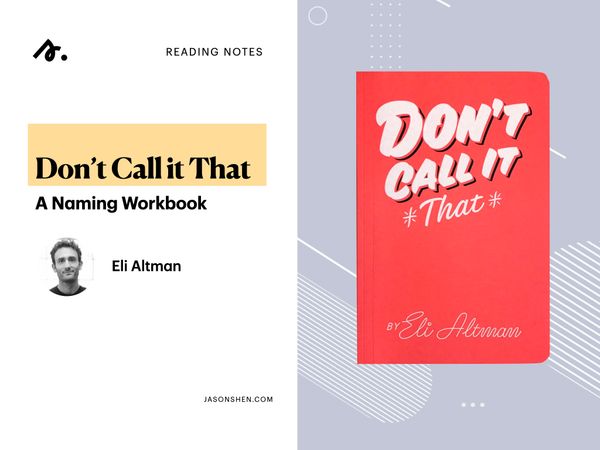Today I’m sharing the insights I gleaned from a wonderful (and fairly short) book Don’t Call it That: A Naming Workbook.
The Book in a Nutshell: Choosing a name for your startup or product is a crucial task because it defines the initial expectations and preconceived notions people will have about your thing. It’s easy to pick a bland name, but really try hard to think up a lot of name options and pick something weird, differentiated, and memorable.
About the Author: Eli Altman is the Creative Director of a naming company called A Hundred Monkeys (good name right?) which has worked with startups and Fortune 50 companies to name products. For example, they helped a wearable tech company called Pulsetracker rebrand to Basis.
Key Points
1. “It’s hard to gain traction if people can’t remember what you’re called. The name is often the first thing anyone will come in contact with. It’s your first impression.”
Eli is stating the obvious here. Especially for new companies, the first time someone hears about your firm is through seeing the name written or hear it uttered somewhere. And what that name sounds, looks, and feels. Names matter.
2. “[Great names] have nerve, ambition, personality, a mission, and yes, they take risks. Because the easier a name is to spell or pronounce or recognize or understand or label, the easier it is to forget.”
There is definitely a danger (especially among startups) of picking a common word and just misspelling it (Flckr, Tumblr, etc) but the fact is many people are worried if their name isn’t spell-able or well labeled, that people would forget it, and that it might offend some people. Altman wants us all to get over that.
3. “Thinking about names without first establishing your positioning is like selecting a box before buying the present that’ll go in it. It’s a decision without context.”
Since the name is just a part of the overall brand, Altman has you doing many exercises that involve thinking about your product’s positioning, how it compares to competitors and alternatives, and what you want the name to evoke emotionally.
4. “Groups of people don’t agree on what’s cool or interesting, they agree on what’s easy to agree on.”
Altman recommends not using focus groups or otherwise asking a ton of people for feedback on your name. It can’t be a group decision. If anything, tell customers and potential customers that “my company is ____ and it does ___.” Watch their reaction and get a sense from their facial expressions and body language whether the name connects for them.
5. “At some point in the not-too-distant future, dot coms are going to be an anachronism. Don’t let this be the thing that gets between you and coming up with the right name for your business.”
Paul Graham is all about making sure your startup gets the .com, but it is nice to get an alternative perspective. It’s true that depending on your company, and how people interact with it, search, social, and mobile may be the main drivers of the product, rather than the .com.
6. “What draws people in? – mystery -obscurity -romance -subtlety -comedy -confidence”
Just really liked this list of criteria for discovering a new name. None of these are about being “loud” or “obvious”. They also use the examples of Mechanical Turk, Retrofit (a high tech weight loss program for executives), Arrogant Bastard, all as iconic brands that were’t afraid to be edgy and different.
7. “There are so many great words that are not commonly used— words you can own and define for your audience. Made-up words usually take a lot of work for people to remember and don’t have any cool associations built in.”
Eli is an advocate of not inventing entirely new words like like Xerox, Spotify, or Roku . Instead, he believes in taking a word he might already know in one context, and foster a whole new meaning for it. Like Starbucks (which apparently came originally from Moby Dick), Dropbox, and Apple. He has some cool lists of interesting words, like the Secret Service code name list, that he suggests would-be namers dig through. (edit: two more good ones, sort of for my own reference, are Victorian Occupations, Glossary of Science Fiction Ideas and Inventions)
8. “Something I hear a lot is that people will know the right name when they hear it. They want to be blown away by a name. They want to fall in love instantly. This couldn’t be farther from reality.”
Another thing that’s great to hear from someone who’s named a lot of products. Names take time to get used to and the winner probably won’t jump out as the obvious best case scenario.
Name Types
A Hundred Monkeys has identified at least 25 different name categories. Here are a few I liked with an example name.
- Poetic (Lululemon)
- Derivative (Nesspresso)
- Descriptive (Wingstop)
- Part Descriptive, Part Fun (Big Gulp)
- Someone Special (Tesla Motors)
- Daring (FCUK)
- Foreign Feeling (Dasani)
- Mythical (Pandora)
- Name as Statement (Life is Good)
Jason's Names
I feel like I’ve worked on projects that had pretty good names. Here’s my short list:
- Ridejoy (my first startup, a long-distance ridesharing firm)
- Gumball Capital (a nonprofit I helped start in college, which helped raise funding and awareness for microfinance)
- How to Get What You Want (a book I wrote over the 2014-15 holiday break)
- Headlight (a hiring tech company I founded in 2017)
- Midgame (an esports analytics company I sold to Facebook in 2020)
- 13 Fund (an angel philanthropy initiative I started in 2020)

